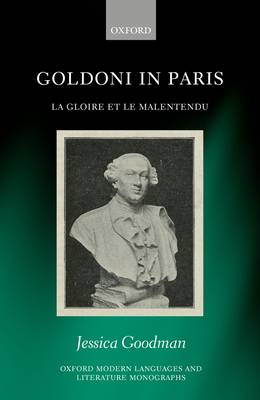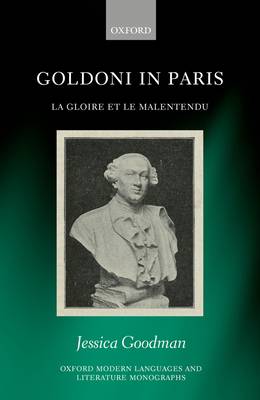
Bedankt voor het vertrouwen het afgelopen jaar! Om jou te bedanken bieden we GRATIS verzending (in België) aan op alles gedurende de hele maand januari.
- Afhalen na 1 uur in een winkel met voorraad
- In januari gratis thuislevering in België
- Ruim aanbod met 7 miljoen producten
Bedankt voor het vertrouwen het afgelopen jaar! Om jou te bedanken bieden we GRATIS verzending (in België) aan op alles gedurende de hele maand januari.
- Afhalen na 1 uur in een winkel met voorraad
- In januari gratis thuislevering in België
- Ruim aanbod met 7 miljoen producten
Zoeken
Omschrijving
The thirty years Carlo Goldoni spent in Paris hold an ambiguous place in his career. The preface to his autobiography explicitly draws attention to France as the site of his authorial glory, but elsewhere he dismisses his work for the Parisian Comedie-Italienne as a failure, and this view has
come to dominate modern readings of his French experience. This study sets out to explore this apparent contradiction. By reading Goldoni's own contemporary and subsequent accounts through the lens of his context as a dramatic author in 1760s Paris, Jessica Goodman sheds new light on both his
experience and critical reactions to that experience. A key part of this contextualisation is an examination of contemporary Comedie-Italienne archives, resulting in the most comprehensive existing account of this oft-neglected theatre and its authorial relations in the period. When material and
artistic conditions at the Comedie-Italienne thwarted the self-fashioning strategies Goldoni had developed in Italy, he turned his attention to other areas of French life; notably the court and the Comedie-Francaise. Yet despite relative success in this regard, his career as an eclectic homme de
lettres was lost in translation to posterity. In his French Memoires, he constructed the claim of Parisian glory according to an out-dated understanding of what it meant to succeed in the French literary field, focusing predominantly on the power of Comedie-Francaise success. Ultimately, this
construction was a failure: in modern France, Goldoni is remembered as a famous foreigner, not the consecrated French litterateur he believed he had become.
come to dominate modern readings of his French experience. This study sets out to explore this apparent contradiction. By reading Goldoni's own contemporary and subsequent accounts through the lens of his context as a dramatic author in 1760s Paris, Jessica Goodman sheds new light on both his
experience and critical reactions to that experience. A key part of this contextualisation is an examination of contemporary Comedie-Italienne archives, resulting in the most comprehensive existing account of this oft-neglected theatre and its authorial relations in the period. When material and
artistic conditions at the Comedie-Italienne thwarted the self-fashioning strategies Goldoni had developed in Italy, he turned his attention to other areas of French life; notably the court and the Comedie-Francaise. Yet despite relative success in this regard, his career as an eclectic homme de
lettres was lost in translation to posterity. In his French Memoires, he constructed the claim of Parisian glory according to an out-dated understanding of what it meant to succeed in the French literary field, focusing predominantly on the power of Comedie-Francaise success. Ultimately, this
construction was a failure: in modern France, Goldoni is remembered as a famous foreigner, not the consecrated French litterateur he believed he had become.
Specificaties
Betrokkenen
- Auteur(s):
- Uitgeverij:
Inhoud
- Aantal bladzijden:
- 248
- Taal:
- Engels
- Reeks:
Eigenschappen
- Productcode (EAN):
- 9780198796626
- Verschijningsdatum:
- 1/06/2017
- Uitvoering:
- Hardcover
- Formaat:
- Genaaid
- Afmetingen:
- 157 mm x 234 mm
- Gewicht:
- 498 g

Alleen bij Standaard Boekhandel
+ 435 punten op je klantenkaart van Standaard Boekhandel
Beoordelingen
We publiceren alleen reviews die voldoen aan de voorwaarden voor reviews. Bekijk onze voorwaarden voor reviews.









